You are probably spending a good amount of money and effort on your Magneto Store SEO. But how can you know it’s working as you intended? Regular tracking is mandatory for that.
In today’s competitive e-commerce landscape, a well-optimized Magento store isn’t just an advantage – it’s a necessity.
For store owners, implementing SEO strategies is only half the battle; the real challenge lies in effectively tracking and measuring their success.
Whether you’re managing a small boutique or a large-scale e-commerce operation, the ability to track and analyze your SEO performance can mean the difference between thriving and merely surviving in the digital marketplace.
This comprehensive guide will walk you through the essential tools, metrics, and strategies needed to measure your Magento store’s SEO success effectively.
Table of Contents
Setting Up Essential SEO Tracking Tools
To effectively monitor your Magento store’s SEO performance, you need to start with the right foundation of tracking tools.
Google Analytics stands at the forefront of this toolkit, offering comprehensive insights into your store’s-
- Traffic patterns
- User behavior and,
- Conversion metrics
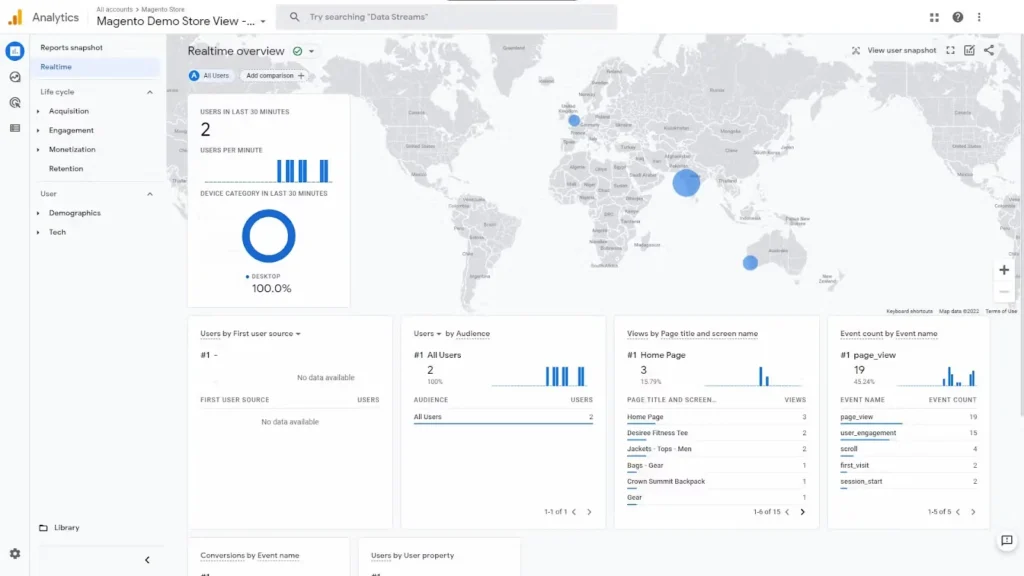
Integration with Magento is straightforward through the admin panel, allowing you to track everything from page views to transaction data.
Google Search Console is another crucial tool that provides direct insights into how search engines view and interact with your site.
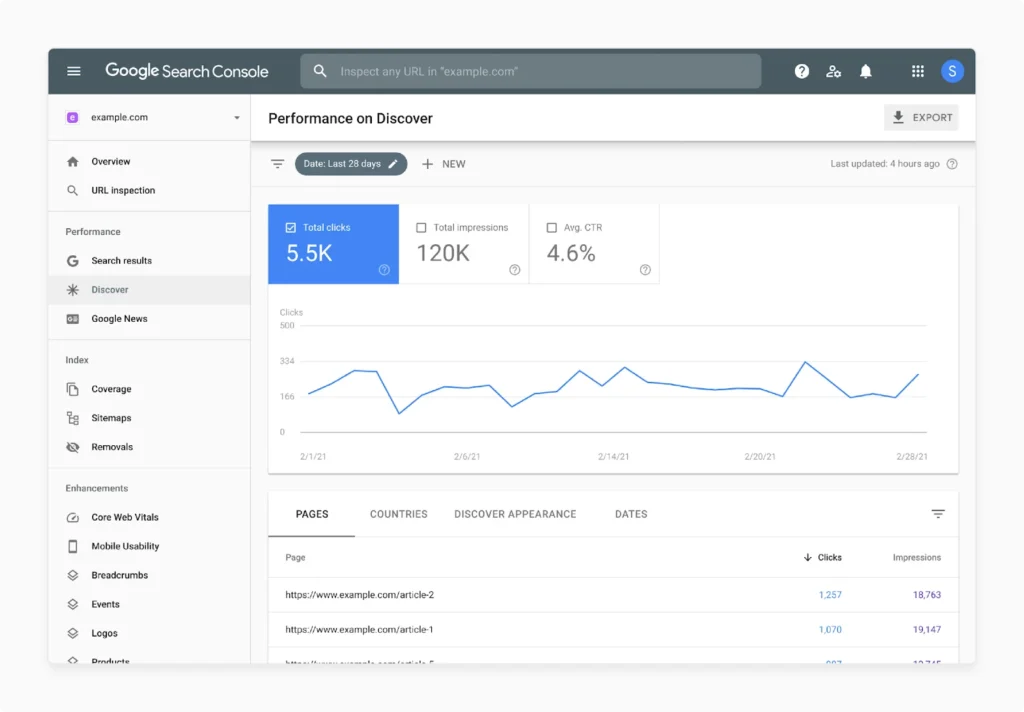
It helps identify technical issues, monitor search performance, and understand which keywords drive traffic to your store.
The platform also offers valuable data about mobile usability and core web vitals, which can significantly affect SEO success.
Magento’s built-in analytics features complement these external tools by providing platform-specific insights.
The Advanced Reporting feature offers detailed information about your products, orders, and customers, helping you correlate SEO efforts with actual sales performance.
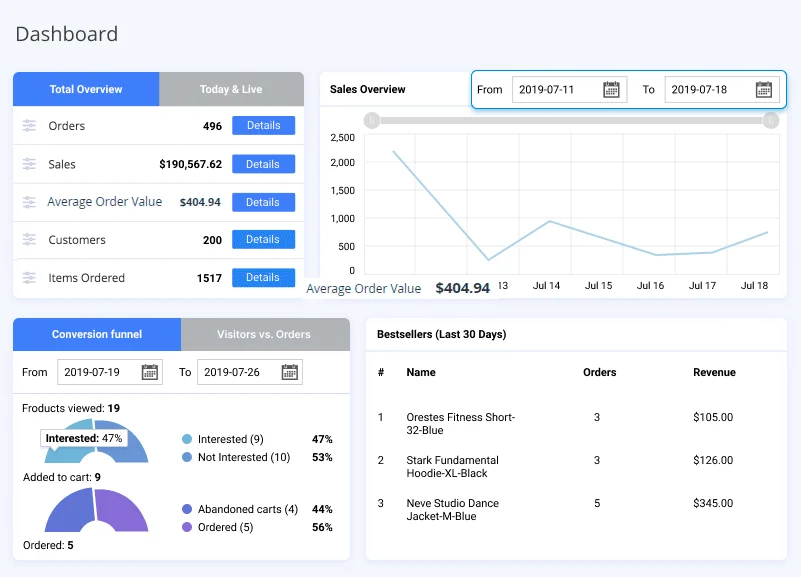
Magento Dashboard
Consider adding specialized SEO tools like SEMrush or Ahrefs to your arsenal.
These platforms provide in-depth keyword tracking, competitor analysis, and backlink monitoring capabilities, giving you a more complete picture of your SEO landscape.
Key SEO Metrics to Monitor
Focusing on the right metrics when tracking your Magento store’s SEO performance is crucial for understanding your campaign’s effectiveness.
Traffic-Related Metrics
Start with organic traffic metrics, which is the number of visitors coming to your site through search engines.
Pay attention to not only overall traffic volume but also traffic quality indicators such as bounce rate, time on site, and pages per session.
Keyword-Related Metrics
Keyword rankings and visibility metrics deserve close attention. Monitor your positions for target keywords, especially those driving conversions.
Track both branded and non-branded search terms, and observe how your rankings fluctuate over time.
Understanding these patterns will help you identify which optimization efforts are yielding results.
Conversion Rates
Conversion rates from organic search traffic are particularly crucial for e-commerce sites. This includes not just completed purchases but also micro-conversions like-
- Newsletter signups
- Wishlist additions and,
- Add-to-cart actions
Compare these rates with other traffic sources to gauge the quality of your SEO-driven visitors.
Page and URL Performance
Page load speed and performance metrics have become increasingly important for SEO success. Monitor Core Web Vitals, including-
- Largest Contentful Paint (LCP)
- First Input Delay (FID)
- Cumulative Layout Shift (CLS)
These metrics directly impact both your search rankings and user experience.
Mobile Optimization Metrics
Mobile optimization metrics are essential, given the prevalence of mobile shopping. Track mobile-specific metrics like-
- Mobile conversion rates
- Mobile page speed and,
- Mobile usability issues
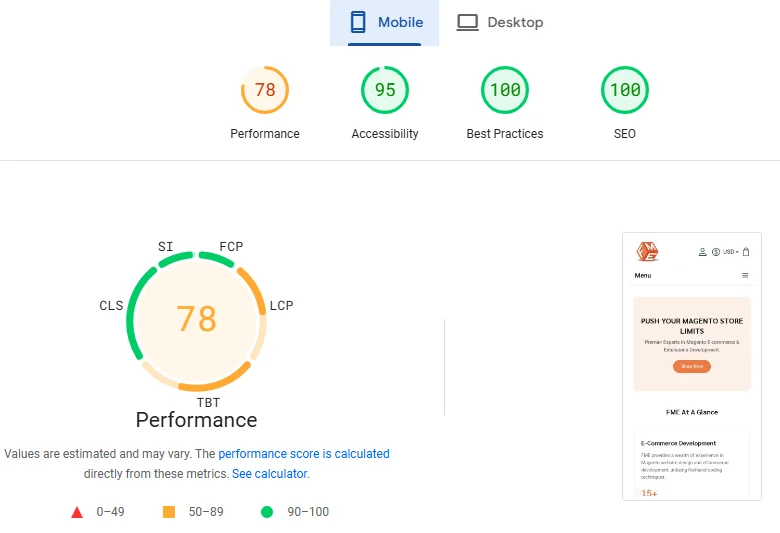
Mobile Performance Tracking Using Google’s PageSpeedInsights
Pay special attention to any disparities between desktop and mobile performance, as these could indicate areas needing improvement.
Understanding Technical SEO Performance
Technical SEO forms the backbone of your Magento store’s search performance. Here’s a detailed breakdown of key technical aspects to monitor:
Site Crawlability & Indexing
- Monitor crawl stats in Google Search Console
- Track the number of indexed pages versus submitted pages
- Identify and resolve crawl errors and blocked resources
- Review robots.txt configuration regularly
Core Web Vitals Performance
- Track LCP (Largest Contentful Paint) for loading performance
- Monitor FID (First Input Delay) for interactivity
- Measure CLS (Cumulative Layout Shift) for visual stability
- Analyze trends and improvements over time
URL Structure & Architecture
- Evaluate URL structure optimization
- Monitor internal linking patterns
- Check breadcrumb implementation
- Review category hierarchy effectiveness
XML Sitemap Health
- Track sitemap coverage and indexing rates
- Monitor the frequency of sitemap updates
- Verify proper inclusion of all important pages
- Check for and resolve any sitemap errors
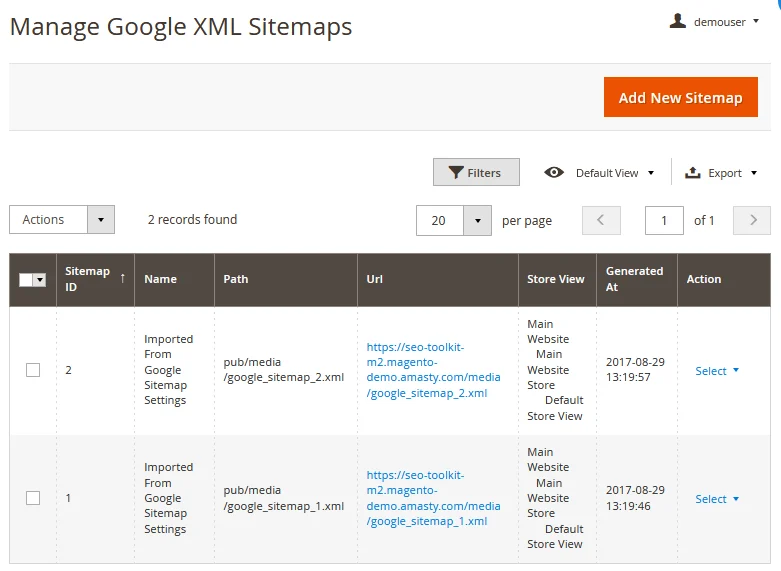
Content Performance Tracking
Understanding how your content performs is crucial for ongoing SEO success. Here’s what to focus on-
Product Page Analytics
- Conversion rates per product page
- Time spent on product descriptions
- Image optimization effectiveness
- Product review engagement metrics
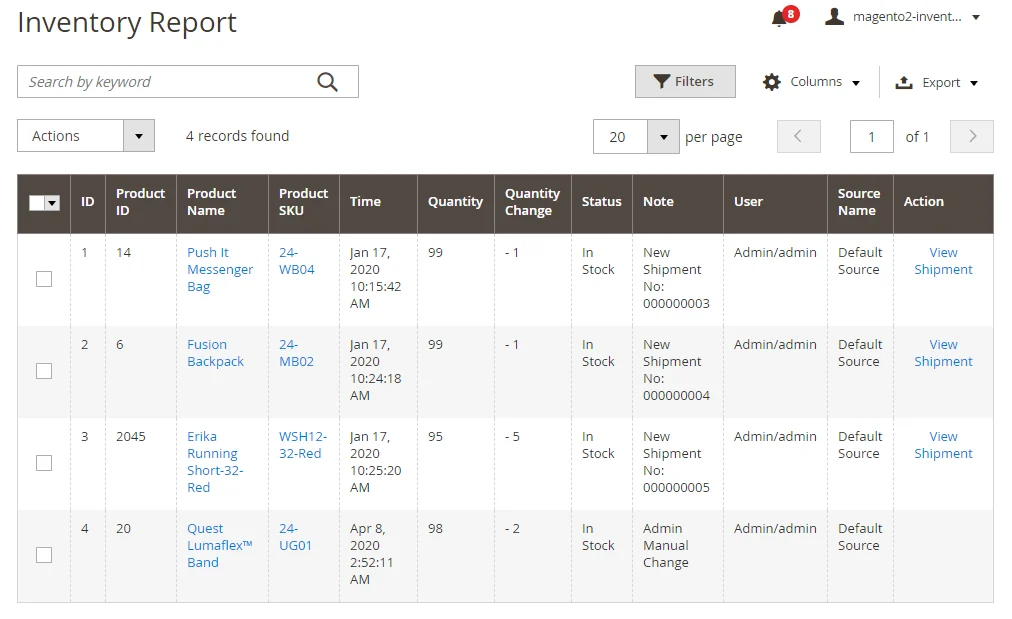
Magento Inventory Report Extension by BSS Commerce
Category Page Success Metrics
- User navigation patterns
- Category page bounce rates
- Filter and sort usage statistics
- Category-specific conversion rates
Blog and Content Engagement
- Average time on blog posts
- Social sharing metrics
- Comment engagement
- Newsletter signups from content pages
User Behavior Analysis
- Heat mapping of key pages
- Scroll depth on important content
- Click-through rates on internal links
- Exit page patterns
Each of these areas provides valuable insights into how users interact with your content and where improvements can be made.
Regular monitoring of these metrics helps identify content gaps, user experience issues, and opportunities for optimization.
Focusing on trends over time rather than absolute numbers will give you a better picture of your content’s improving or declining performance.
E-commerce Specific SEO Metrics
E-commerce SEO metrics require special attention as they directly impact your store’s visibility and sales. Let’s explore the key metrics that matter most for Magento store owners’ success.
Product Search Visibility
Understanding your product search visibility is crucial for e-commerce success. Monitor how your products appear (or hide) in both general and shopping-specific search results.
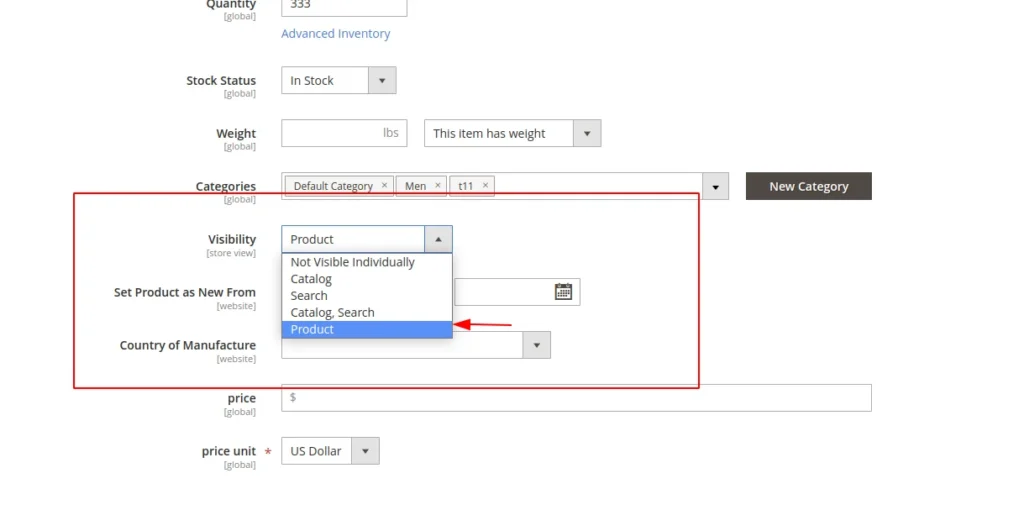
Track product impressions, click-through rates, and position changes over time. Pay special attention to seasonal trends and competitor movements that affect your visibility.
Category Page Rankings
Category pages often serve as crucial landing pages for broader search terms. Analyze how your category pages rank for relevant keywords and track their performance in terms of organic traffic and conversions.
Monitor the effectiveness of your category page optimization efforts, including meta descriptions, H1 tags, and internal linking structure.
Shopping Feed Performance
Your shopping feed’s performance directly impacts your visibility in Google Shopping and other marketplace search results.
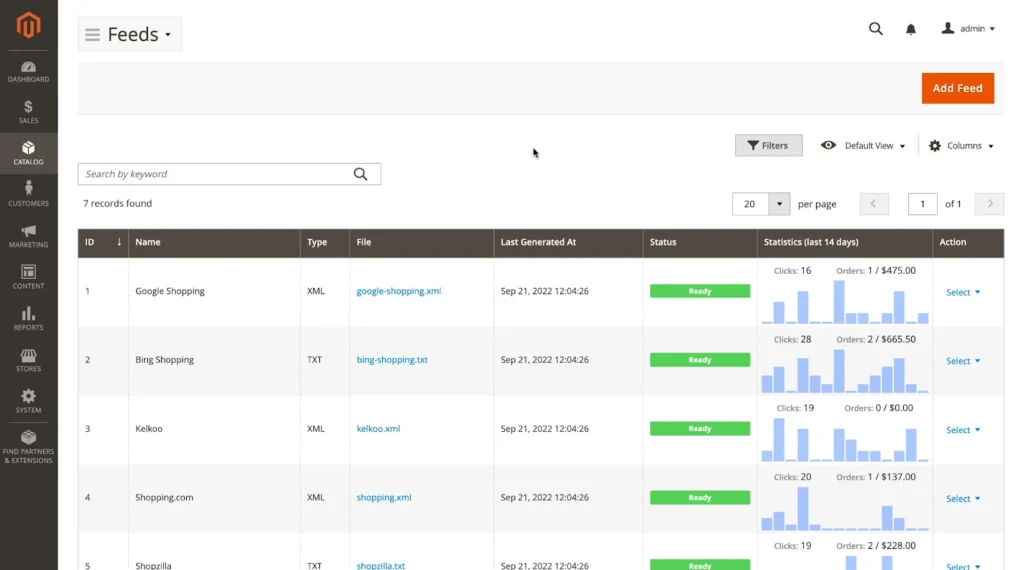
Track feed health metrics, including disapproved items, feed errors, and attribute accuracy. Monitor how changes in product titles, descriptions, and pricing affect your shopping feed performance.
Rich Snippet Effectiveness
Track how your rich snippets appear in search results and their impact on click-through rates.
Monitor product ratings, prices, availability status, and other structured data elements that appear in search results.
Regular testing and optimization of these elements can significantly improve your visibility and user engagement.
Creating and Using SEO Reports
Establish a regular reporting schedule that aligns with your business goals and SEO campaigns. Focus on creating actionable reports that combine data from various sources-
- Google Analytics
- Search Console and,
- Magento itself
Include key performance indicators like organic traffic growth, conversion rates, and revenue from organic search.
Use graphs and charts where appropriate to make your reports visually appealing and easy to understand. Where possible, set up automated reporting to save time and ensure consistency.
You should use these reports to identify trends, spot opportunities, and make data-driven decisions for your SEO strategy.
Conclusion
Tracking and measuring SEO success for your Magento store is an ongoing process that requires attention to multiple metrics and regular analysis.
Remember that SEO is a long-term investment, and success often comes from consistent monitoring and optimization based on data-driven insights.
Keep refining your tracking methods, stay updated with new SEO developments, and always align your measurements with your business goals.
This systematic approach will help ensure sustainable growth for your Magento store.


